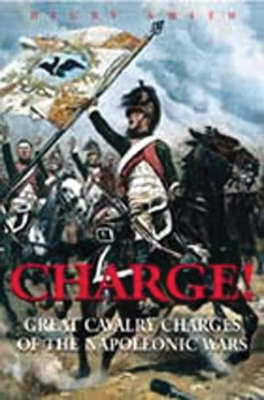Napoleonic Library
2 total works
Cavalry was the queen of the Napoleonic battlefield. Surging squadrons of dragoons, dashing hussars or the awesome might of heavy cuirassiers often snatched victory from the jaws of defeat and decided the fate of kingdoms. In this dramatic and spirited history of cavalry in the Napoleonic period, Digby Smith examines how battles could be decided by the skilful use of cavalry. He outlines the development of the mounted arm - describing the various types of mounted unit, their roles and abilities - and then sets out to describe how cavalry could turn the tide of battle. By examining such key battles as Marengo, Eylau, Albuera, the crossing of the Beresina and Waterloo, Charge! reveals how cavalry could be deployed in an offensive and defensive capacity or how an effective and well-timed cavalry charge could overcome almost any obstacle. The scenarios have been carefully selected to reveal how leadership, training, weather, terrain and the condition of the horses could affect the success of a charge. Replete with eyewitness accounts and tales of outstanding courage and valour, Charge! is a dramatic read as well as a fascinating insight into the role and performance of cavalry on the Napoleonic field of battle.
The Decline and Fall of Napoleon's Empire explores errors that Napoleon made which led to his downfall and analyses the flaws in his character from a new perspective. There has been a torrent of literature produced about Napoleon ever since his exile to Saint Helena in 1815. Everything from his battles and his tactics to his finances and hats has been subjected to repeated microscopic probing and analysis. Until now, however, there has been no study of the significant errors that Napoleon made himself which, though apparently trivial at the time, proved to be major factors in his downfall. Digby Smith tracks his rise to power, his stewardship of France from 1804-15, and his exile. He highlights his military mistakes, such as his unwillingness to appoint an effective overall supremo in the Iberian Peninsula, and the decision to invade Russia while the Spanish situation was spiralling out of control. Smith also scrutinises naval mistakes - notably, Napoleon's inability to comprehend the intricacies of naval operations, his impatience with his admirals, and his failure to invest in ships and men.
Smith also tracks diplomatic and political errors, highlighting his inability to conclude lasting peaces and to compromise. Smith finally addresses domestic and economic blunders, such as the establishing and maintenance of the Continental System across Europe, the imposition of a ban on direct trade with Russia (which led to France paying higher prices for naval stores of Russian origin after they passed through the hands of German middlemen), and the cost of creating various kingdoms and principalities and deposing incumbent rulers to place his relatives on their thrones.
Smith also tracks diplomatic and political errors, highlighting his inability to conclude lasting peaces and to compromise. Smith finally addresses domestic and economic blunders, such as the establishing and maintenance of the Continental System across Europe, the imposition of a ban on direct trade with Russia (which led to France paying higher prices for naval stores of Russian origin after they passed through the hands of German middlemen), and the cost of creating various kingdoms and principalities and deposing incumbent rulers to place his relatives on their thrones.

